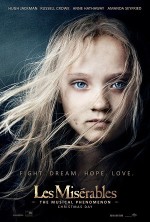Les Misérables

In case you’ve never tried to read it, Les Misérables is really, really long; one of the longest books ever written. So, to paraphrase Inigo Montoya, “there is too much, let me sum up.”
In post-Napoleonic France, money is scarce, and so is compassion, so when Jean Valjean (Hugh Jackman) is driven to steal a loaf of bread to feed his starving family, he is sentenced to five years in prison, and then another 15 for trying to escape.
Even after serving his time, he will have to spend the rest of his life carting around a notice letting everyone know he is a convicted felon and thus not fit for civilized life, offering him few options but to return to crime, as the stern Inspector Javert (Russell Crowe) reminds him. And it almost becomes a self-fulfilling prophecy, until Valjean is shown leniency by a kindly priest and decides to remake himself as an honest, god-fearing man.
Though musical theater and its older cousin opera predate film by centuries, the format itself seems made for film, with its wide palette and large stage capable of visually representing and accentuating the melodrama natural to the genre to its best advantage. The nature of film and montage means scenes and numbers don’t have to be reduced to just one set, but can take on a full life of their own — such as the fully-realized dock where Les Misérables opens — with the visual power of the medium allowing the fancifulness and romanticism musicals need to take full bloom.
That romanticism and fancy is at full bloom in Tom Hooper‘s (The Kings Speech) long, long in the making adaptation of the classic musical. Most obviously, and most pleasingly, Hooper uses the scale of film to create the world of Les Misérables in full, not realistically but emotionally correctly, from a monastery perfectly poised on a cliff to Javert’s cold and rainy headquarters to the streets of Paris.
The mise en sc`ne is impossibly rich, the way a musical needs it to be, and the most beautiful of the year, including various large-budget fantasy films. Because unlike any of those others, Hooper and his filmmakers are not going for realism or particularly caring about it — it’s a sung-through stage play, after all — he’s going for romance, in the classic sense.
Hooper has filled his sets and streets with a sterling cast to bring the classic musical to life. Hugh Jackman has finally been given a role which takes a full advantage of all his talents and proves he is more than up to the task. He is Jean Valjean, and all of the X-Men: Origins – Wolverines and Real Steels of his career up ’til now are forgiven.
He is ably matched by Russell Crowe’s Javert, in temperament if not in stature — through force of will, Crowe is able to get over the fact of having the weakest voice in the cast, providing the icy will and hate Javert requires, whether he is trying to figure out if the local factory owner could be the long-lost Valjean or spying a on a group of student revolutionaries.
But they’re all blown away by Anne Hathaway, who walks away with the film despite being in just two or so minutes of it; she inhabits Fantine, a young factory worker forced into a life of prostitution in order to support her daughter Cosette, with such pathos it will take your breath away. And she has the best voice of the cast, topping even Broadway star Samantha Banks.
Still, the film has the structural problems of the play, which may be off-putting for the neophyte. The plot staggers and leaps around, jumping locations and years in the blink of an eye, meandering from Valjean’s jail to a factory, where Valjean’s path crosses with Fantine and he adopts the young Cosette, to adult Cosette’s (Amanda Seyfried) cavorting with students rioting in the streets of Paris.
Much of the context needed to make proper sense of these comings and goings is lost, as well, despite the film’s three-hour running time, as Hooper works to keep it as faithful a recreation as possible. Right down to the constant reappearances of the Madame and Monsieur Thénardier, who are nowhere near entertaining enough to make their constant incursions necessary, no matter how hard Helena Bonham Carter and Sacha Baron Cohen try.
But, if it’s not perfect, it is certainly great, capturing the romance and fantasy of the musical form with no apologies or irony. A fantastic cast well up to the task, combined with stellar production values, makes it as good an adaptation of Les Misérables as you could hope to find.
Cast: Hugh Jackman as Jean Valjean; Russell Crowe as Inspector Javert; Anne Hathaway as Fantine; Amanda Seyfried as Cosette; Eddie Redmayne as Marius Pontmercy; Samantha Barks as Éponine; Helena Bonham Carter as Madame Thénardier; Sacha Baron Cohen as Thénardier; Aaron Tveit as Enjolras; Daniel Huttlestone as Gavroche.



Leave a Reply